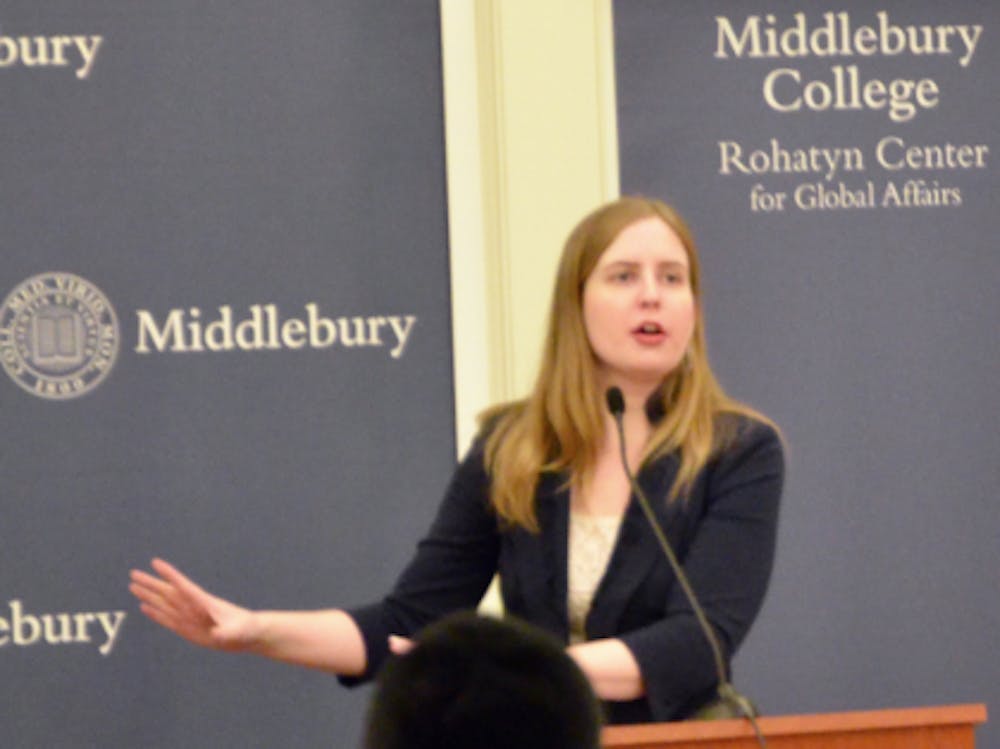The third annual Student Global Affairs Conference, titled “Power and Protest: Global Responses to Atomic Energy,” explored the multidimensional issue of nuclear proliferation and took place over the course of two days featuring five speakers. The student-designed topic was selected from a group of four submissions.
“We chose it because the other submissions had a more narrow scope. Nuclear energy is a much broader topic,” Program and Outreach Fellow David Russel ’15 said.
The winning group behind the topic included Tim Fraser ’16, Mohamed Hussein ’17, Eunice Kim ’17 and Dan Batekyko ’16. They organized speakers for the conference and constructed the schedule of events including five lectures, a career and internship information session, a music workshop and a film screening.
“This conference is meant to educate both campus and community members about global issues from global perspectives,” said Russel. “What makes this conference special is that it was entirely student-designed. In that way, not only is it giving the organizers the experience of putting together an entire conference, it also means that these conference topics are responsive to what students want to learn about.”
2016 marks the fifth anniversary of the Fukushima disaster in Japan and the 30th anniversary of Chernobyl in the Soviet Union.
“The March 11 disaster in Japan really put nuclear energy at the front of a lot of countries’ decision-making questions,” said Keynote Speaker Dan Aldrich, a professor at Northeastern University. “What kind of decisions do we need to make and how will we move forward?”
Aldrich began the conference with a presentation of his research on factors that determine where governments place nuclear power facilities. He concluded that wealthy areas with strong community ties are able to veto the development of nuclear power plants while less permanent communities could not. Aldrich hoped to open up the audience’s mind to the complexity of nuclear power.
“What are the politics of energy?” Aldrich said. “It’s not as simple as the engineering suggests. It’s about what goes into the process. The more accidents we see, the more we are thinking about what is beyond just building the plant. What if it breaks down? What if there’s a leak? What if it explodes? I think that this is the most important question: Who are the beneficiaries and who are those that can pay the costs?”
The conference continued with presentations on proliferation in an international context. Jessica Varnum, a researcher at the James Martin Center for Nonproliferation Studies, spoke about the complex process of obtaining nuclear technology.
Varnum, an adjunct professor at the Middlebury Institute of International Studies at Monterey, enjoyed building the connection between Middlebury’s Monterey and Vermont campuses.
“It’s great to see some of the partnership we started in action,” she said. “I would like to see a lot more of that back and forth between our students and professors, because there’s a lot that we can offer to Middlebury and a lot that they can offer to us.”
Fraser said the conference fit in nicely with Middlebury’s interdisciplinary focus.
“We have political scientists speaking, an expert on nuclear securities and a physicist who’s going to be dealing with the economics of the issue,” he said. “I think this is a beautiful synthesis of different social science approaches to it, both at the international and national scale.”
Fraser said the stigma around talking about nuclear power posed the greatest challenge to organizing the conference.
“Nuclear power is not really a common thing to talk about,” he said. “It’s a nationalist thing. Countries invest a lot of money in this new kind of technology and we thought that five years after Chernobyl and five years after Fukushima, it’s a neat time to think about what’s happening with nuclear power now.”
Keeping the conference unbiased was another major concern.
“We had to figure out, ‘do we want to portray this as pronuclear or antinuclear?’” Fraser said. “We figured the best way was to invite academics and professionals who can really speak authoritatively on the subject and remove that question altogether — let the audience do it.”
Friday’s lecturer, Niroko Manabe, author of The Revolution Will Not Be Televised, explained that she came to present her opinion.
“I think we already know what the Japanese government thinks, and I think it’s good to just present it from another perspective,” she said. “I’m not trying to give a balanced view as much as an alternative view.”
Students and faculty enjoyed the breadth of speakers.
“I got to see several sides of the nuclear power debate and learn a lot about the science and positive reasons for nuclear power. I feel like we always hear the negatives but rarely hear the positives,” Zach Berzolla ’18 said.
Atomic Energy Makes Waves

Comments



